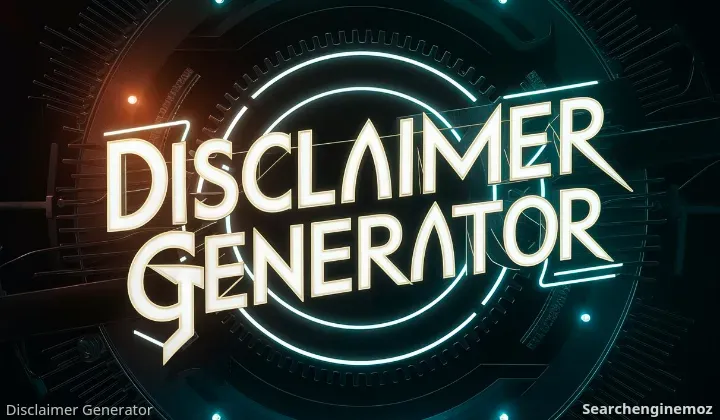Instant Disclaimer Generator - Get your custom disclaimer in seconds
Creates a Disclaimer Page for Your Websites and Blogs for Free
- Fill in the three required fields below.
- Click "Create Disclaimer."
- That's it! Copy the generated HTML code for the disclaimer.
- Create a new page on your website, name it "Disclaimer," and then paste the code into the HTML editor.
Free Disclaimer generator
Understanding Website Disclaimers _ A Comprehensive Guide
This comprehensive guide will delve into the world of website disclaimers, exploring their purpose, types, key elements, and best practices for implementation.
The Purpose and Importance of Website Disclaimers
Types of Website Disclaimers
- General Disclaimer 📌A general disclaimer covers a wide range of potential liabilities, including errors, omissions, or inaccuracies in the website's content. It typically states that the website owner is not responsible for any damages or losses resulting from reliance on the information provided.
- Views Expressed Disclaimer 📌This disclaimer clarifies that the views and opinions expressed on the website are solely those of the author and do not necessarily reflect the views of the website owner or any affiliated organizations.
- No Warranty Disclaimer 📌This disclaimer states that the website owner makes no warranties or guarantees about the accuracy, completeness, or reliability of the information provided. It also disclaims any liability for damages or losses arising from the use of the website's content.
- Professional Advice Disclaimer 📌This disclaimer clarifies that the information provided on the website is for general knowledge or entertainment purposes only and should not be construed as professional advice. It encourages users to seek professional consultation for specific situations or concerns.
- Affiliate Disclaimer 📌This disclaimer discloses any affiliate relationships or sponsored content on the website. It informs users that the website owner may receive compensation for promoting certain products or services.
- External Links Disclaimer 📌This disclaimer states that the website owner is not responsible for the content or practices of any external websites linked to from the website.
- Privacy Policy 📌This is not a disclaimer per se, but rather a separate document that outlines the website's policies and practices regarding data collection, use, and sharing.
Key Elements of an Effective Website Disclaimer
- Clarity and Conciseness ✔️ The disclaimer should be written in clear and concise language that is easy for users to understand. Avoid using legal jargon or complex terminology that may confuse or intimidate users.
- Specificity ✔️ The disclaimer should be specific to the potential liabilities or risks associated with your website's content or services. Avoid using generic or boilerplate disclaimers that may not adequately address your specific circumstances.
- Visibility and Accessibility ✔️ The disclaimer should be prominently displayed on your website in a location that is easily accessible to users. Consider including it in your website's footer, terms and conditions, or as a separate page linked from the homepage.
- Regular Updates ✔️ Review and update your disclaimer regularly to reflect any changes in your website's content or services, as well as evolving legal regulations.
Best Practices for Implementing Website Disclaimers
By following these best practices, you can ensure that your website disclaimers are effective in protecting your interests and providing transparency to users.
FAQ
What information does the disclaimer cover?
The disclaimer covers the terms of use, limitations of liability, intellectual property rights, privacy policy, and any other legal aspects related to the website's content and services.
Is the disclaimer legally binding?
Yes, the disclaimer is legally binding, and by accessing the website, users agree to abide by its terms and conditions.
What are the limitations of liability stated in the disclaimer?
The limitations of liability typically include clauses that limit the website owner's responsibility for any damages or losses incurred by users while using the website, such as disclaimers for accuracy of information, availability of services, and indemnification clauses.
Does the disclaimer address intellectual property rights?
Yes, the disclaimer outlines the website's stance on intellectual property rights, including copyright, trademarks, and other proprietary rights, and may include provisions regarding the use of content and materials on the website.
How does the disclaimer handle third-party links or content?
The disclaimer may state that the website is not responsible for the content of third-party websites linked to or referenced on the site, and users should use discretion when accessing external links.
Are there any specific warnings or disclaimers regarding user-generated content?
Yes, the disclaimer may include warnings about the nature of user-generated content and disclaim any responsibility for the accuracy, legality, or appropriateness of such content.
Does the disclaimer outline the website's privacy policy?
Yes, the disclaimer typically references the website's privacy policy, which governs the collection, use, and protection of user information.
How can users report inaccuracies or issues with the website content?
The disclaimer should provide information on how users can report inaccuracies or issues with the website content, such as through a contact form or email address.
Are there any age restrictions or disclaimers regarding minors' use of the website?
Yes, the disclaimer may include age restrictions and disclaimers stating that certain content or services on the website are intended for adult audiences only.
Does the disclaimer include jurisdiction and governing law clauses?
Yes, the disclaimer may include clauses specifying the jurisdiction and governing law applicable to any disputes arising from the use of the website, as well as dispute resolution mechanisms such as arbitration or mediation.

